Politicon.co
Hungary’s neutrality on the Russo-Ukrainian War and its consequences. May pragmatism lead to a governmental change?
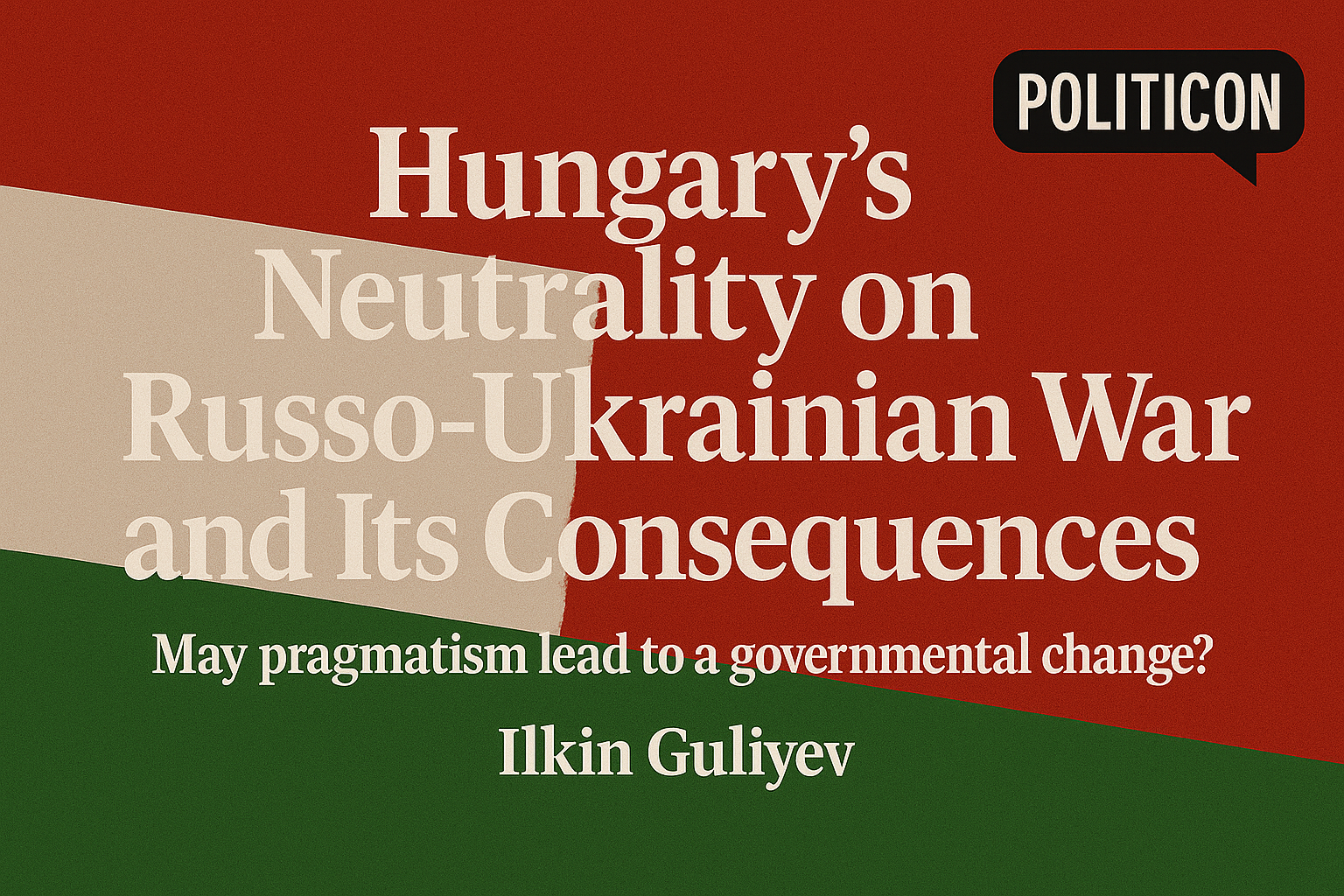
When Russian tanks rolled into Ukraine on February 24, 2022, the world was thrust into a new era of geopolitical instability. The invasion has shattered the post-Cold War order, reignited fears of great power confrontation, and prompted countries across the globe to reevaluate their security doctrines and alliances. As most European capitals rushed to support Kyiv and cut off ties with Moscow, Hungary has taken a divergent path by declaring neutrality. While Hungary’s response to the war has been condemned and labelled as “pro-Putin” by most of Europe, it has also led to various attempts to argue the underlying reasons behind the widely criticised stance. As part of these efforts, this essay aims to address this intriguing question through the lens of the main pillars of Hungarian foreign policy and cover its implications.
Pragmatic Foreign Policy and Eastern Opening
The landslide victory of the Fidesz party in 2010 is regarded as a milestone in Hungarian history. Under Orbán’s leadership, Hungary has undergone major changes, drawing both criticism and controversy. Unavoidably, the foreign policy of Hungary has also experienced changes. In 2011, Hungary adopted a new foreign policy doctrine, which serves as a guideline regarding its foreign policy activities. According to the document, the Hungarian foreign policy is defined as “value-based”, meaning that the goals and interests are derived from the values Hungary associates itself with. Orbán’s interpretation of value-based foreign policy is detached from ideologies and values and solely relies on Hungary's national interests. This type of policy is identified as pragmatic, as the national interests drive the government’s actions. The modern approach to pragmatic foreign policy describes it as one of the elements of neorealism, which fundamentally amounts to avoiding moral and ethical considerations, wherein only short-term political and economic interests outweigh.
By setting aside values and ideologies, Hungarian foreign policy aims to establish beneficial relationships with great powers. As the driving force behind foreign policy is national interests, Hungary demonstrates flexibility regarding who it is negotiating with. This partly explains why it has pursued an “Eastern Opening” policy. Commenting on this, Orbán stated that the sole purpose of Hungarian foreign policy should be national interests, and negotiating with Türkiye or other states in Asia cannot be understood as abandoning its principles but rather as making foreign policy.
The term “Eastern Opening” was introduced in Hungary’s foreign policy agenda in 2011. At the core of the new policy was the aim to enhance Hungary’s trade relations with the growing East, particularly China, Russia, and the Arab world, and attract incoming foreign investments. Another factor contributing to the emergence of “Eastern Winds” in Hungarian foreign policy was the belief that while the East rises, the West declines.
The new foreign policy, ensuring the reorientation towards the East, can also be interpreted as an attempt to trace the roots of the ancient Hungarian tribes, who came from the East. Orbán referred to this during his visit to Kazakhstan, saying, “We have close people here, while we do not have any relatives in Brussels”.
Pragmatism in Crisis: Hungary’s reaction to the war
Russia’s invasion of Ukraine, which began with the occupation of the Crimean Peninsula in 2014, has been a crucial test for Hungary's pragmatic foreign policy. Hungary was expected to stand with its EU and NATO allies against Russia. However, Hungary declared neutrality and even went so far as to call Zelensky an enemy and demand autonomy for the Hungarian minority in western Ukraine. Hungarian officials repeatedly stressed that they do not consider Russia a threat to their sovereignty.
Another point making Hungary’s stance towards Russia particularly interesting is its negative historical memory of Russia. Russia’s repression of the 1848 and 1956 revolutions and the rigid military rule in Hungary from 1945 to 1991 fueled this sentiment. However, Hungary has taken a stance that contradicts this historical background.
Following Russia’s full-scale invasion of Ukraine in 2022, Hungary’s neutrality has led to tense relations with its allies. Despite voting in favour of all sanctions deployed on Russia, Hungary has harshly criticised the EU and sanctions. The peak of the deterioration is probably in the relationships with Poland. Before the war, the two countries were friends and allies, particularly against the EU. Nevertheless, despite sharing significant similarities and interests, Hungary and Poland have taken divergent paths since the war began.
Under the PiS party, Poland led the campaign against Russia, believing the Baltic States and Poland could be the next targets. Poland also officially criticised Hungary’s position. The former Deputy Prime Minister of Poland, Jarosław Kaczyński, said that Orbán should see an eye doctor if he cannot see what is happening in Bucha, where the Russian troops reportedly killed Ukrainian civilians. In response, Orbán stated that he understands some countries’ concerns stemming from the Russian aggression in Ukraine, particularly the Baltic States and Poland, but Hungary feels no such threat. This remark explicitly shows that Orbán is trying to maintain a balance between the West and the East while understanding the position of Poland and justifying Hungary’s stance at the same time.
Energy Security and Russia
While assessing Hungarian foreign policy, particularly in relation to Russia, it cannot be fully understood without considering the role of energy security concerns. The Hungarian government constantly states that energy security is a primary concern for Budapest.
Figure 1: Hungarian energy production, TES (total energy share), and TFC (total final consumption) in 2020. (IEA)
As the figure from the last report of the International Energy Agency (IEA) on Hungary shows, Budapest relies heavily on energy imports for its total energy share (TES). As such, gas and oil account for two-thirds of the total final consumption (TFC), particularly used in buildings and industry.
A significant majority of the gas and oil consumed in Hungary is imported. According to the IEA report, in 2020, Hungary imported 95% of the country’s total gas from Russia. This data illustrates Hungary’s heavy reliance on Russia. It can be said that this trend will continue, as Budapest renewed its gas supply agreements with Russia in 2021.
Figure 2: Hungary’s natural gas trade per country, 2000-2020. (IEA)
Similarly, Hungary heavily relies on imports in terms of its oil consumption. Oil plays a significant and growing role in Hungary’s energy system. As reported by the IEA, oil imports from Russia accounted for 64% of Hungary’s total crude oil imports, marking a substantial decrease compared to previous years.
Figure 3: Hungary’s net trade in crude oil, natural gas liquids and refinery
feedstocks, by country, 2000-2020 (IEA)
Furthermore, nuclear energy plays a vital role in electricity generation in Hungary. In 2020, it provided 48% of Hungary’s total electricity generation. It is therefore, the Paks site is particularly crucial for the country, as it is the only nuclear power plant in Hungary, with its four reactors. Hungary signed an agreement with Russia in 2014 to build new plants in order to replace the existing ones, which are coming to the end of their lifespan. The timing of the agreement is highly symbolic, as it coincided with the backdrop of the Russian invasion of Ukraine. According to the terms of the Paks-2 deal, Russia agreed to provide the construction and technical support. Following this agreement, the sides signed a financial contract stating that Russia was responsible for 80% of the total expenditures, while Hungary was responsible for the remaining 20%. This deal means that Hungary will be indebted to Russia until the middle of the century.
The heavy reliance on Russia has pushed Hungary to keep pragmatic relations with the Kremlin. Commenting on the Paks-2 deal, Putin stated that if Hungary were forced to quit the agreement, it would likely have considerable repercussions for Hungary and its national interests. This remark can be interpreted as a clear threat and a picture showing asymmetry in the relationships between Hungary and Russia. Moreover, Russia constantly appreciates Hungary’s pragmatic foreign policy, emphasising the necessity of a pragmatic and ideology-free foreign policy.
Final Remarks
As discussed above, Hungary’s reliance on Russia for its energy security makes it highly vulnerable and explains its pragmatic policy towards Russia and Russia-related issues. It is also the key factor in understanding why Hungary’s stance towards Russia opposes Poland's, despite their significant similarities. While Poland managed to end its dependency on Russia’s natural resources, Hungary has become even more dependent. From the current perspective, it is very unlikely that the Russian gas and oil dependency will end in the near future.
On the other hand, it is difficult to say that the pragmatism in the Hungarian foreign policy has brought many advantages and opened more doors. Instead, it has led to a decline in sympathy towards Hungary and a turn away of investors from Hungary.
Unavoidably, the ongoing developments have internal implications for Hungary. According to recent polls, the Fidesz party was surpassed by the Tisza party, led by the opposition leader Péter Magyar. The rise of the opposition, growing tensions with the EU, and hot debates over the decision to withdraw from the International Criminal Court are challenging the Fidesz government. All these factors make the potential government change in Hungary for the first time since 2010 very likely in the next elections.
![]()



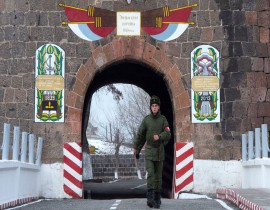
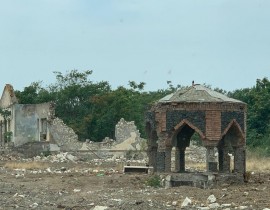
png-1748065971.png)
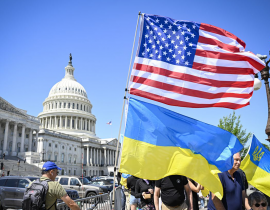

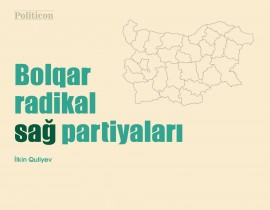
jpg-1599133320.jpg)

